Ecolacy is shorthand for ecological literacy; a community based means of protecting one another, safeguarding common property resources and guaranteeing access to sources of value which are both the natural and cultural resources of a region, nation, or continent.
"The failure to develop ecological literacy is a sin of omission and commission. Not only are we failing to teach the basics about the earth and how it works, but we are in fact teaching a large amount of stuff that is simply wrong."
![]() David Orr, Ecological Literacy, p 85.
David Orr, Ecological Literacy, p 85.
Ecology is a synthetic science | true ecology is not a subset | ecological science defines limitations | ecolacy forms a related web
Learning to live ecolately with one another.
South African township for native peoples, Drakensburg Mountains. [2002, JVS]
"The natural world is organized into a web of life more complex than we know."
Garrett Hardin, p. 23, Filters Against Folly, (NY: Viking,-Penguin, 1985).
Identify the features of any model, plan, or actual place that promotes operational, as opposed to ecological goals, and the preservation of scenic values according to Ian McHarg and Aldo Leopold.
A stonewall in the Berkshires, along a roadside leading to William Cullen Bryant's home.
Ecolacy is to ecology what literacy is to literature; an ability to read analytically and imaginatively.
What does it mean to be informed ecologically?
To desire a more balanced and naturally renewing state of affairs.
Ecology is a synthetic science | true ecology is not a subset | ecological science defines limitations
Ecological Literacy is ecolacy | ecolacy forms a related web
| words | ecolacy | literacy |
|---|---|---|
| ecolate | literate | |
| meaning | the ability "to read" the landscape. | the basic ability to read & write. |
| Able to interpret relations among natural & artificial elements in a scene. | Competent to express meaning in writing from reading. | |
| terms | ecology | literature |
| examples | Accurately describe functional dependencies of different forms in the surroundings. | Correctly putting syntax and grammar together to create accurate meaning. |
| A capacity to examine how parts of a place fit together to sustain all of its residents. | Achieving a level of knowledge about a specified subject so that you can read & write about it. |
Perspectives from the past and present:
Operational -- the functional necessities of any community for water, food, shelter, safety & migration (transport). Includes health, fire safety, police, education, roads and sanitation.
Ecological -- the formal & functional essential factors that sustain life, health and replenishment. Such as solar radiation, water, vegetation, wildlife & fisheries, air quality, sufficient space & nest privacy.
Scenic -- the formal association among pleasing, picturesque, or impressive landscapes or a full range of views of those landscapes, features or elements that make up a describable whole.
Nineteenth century street scene photographed in Lexington, Kentucky.
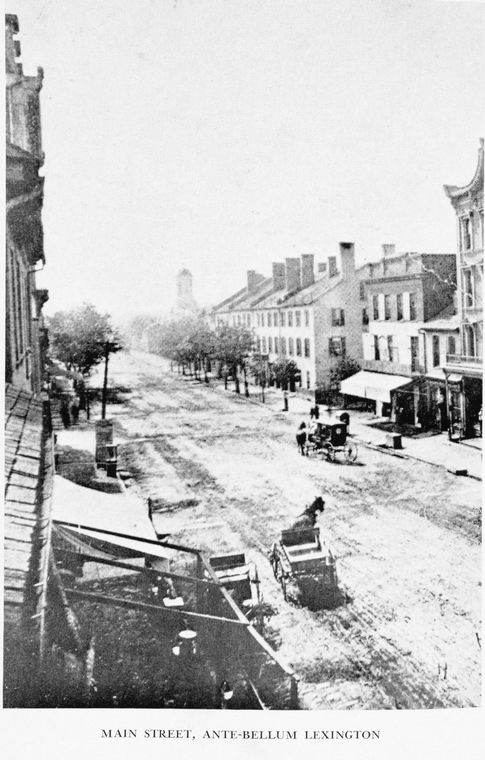
Note the scale of the street width in comparison to the wagons and the size of the trees.
Operationally the street is bounded by one, three, and even four story structures with covered and uncovered walkways astride a comparatively wide means of conveying goods and people. [Comparatively speaking, meaning in relation to the size of the wagons or carriages.]
Ecologically the trees, disposal of the horse remains, and dirt streets impose a set of restraints on the community.
Scenically a diagonally pictured street may or may not seem appealing to a viewer but in terms of the size and proportion of the buildings, wagons and people, the view informs us about the conditions of city life in the 1800s, before mechanization and electrification.
Treasure Coast Regional Planning Council
BUILDING PLANS and URBAN DESIGN PRINCIPLES for
TOWNS, CITIES & VILLAGES
in SOUTH FLORIDA
1998
INDIAN RIVER • ST. LUCIE • MARTIN • PALM BEACH
"The physical form of our built environment is a complex arrangement of streets, buildings, and public and private spaces. The nature of this arrangement fundamentally shapes our neighborhoods, towns, cities, villages and the countryside.
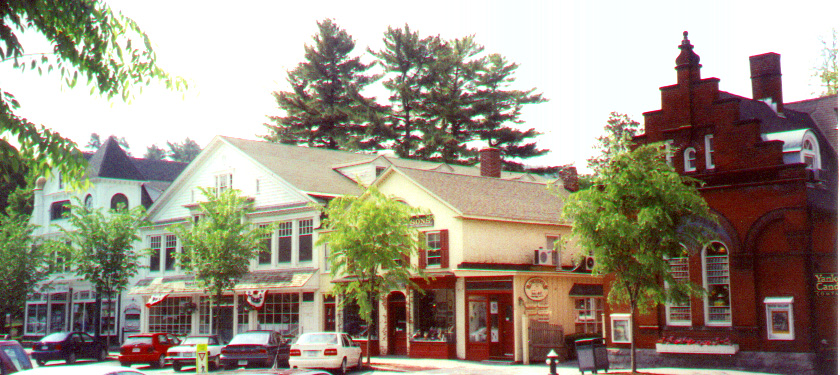
Stockbridge, Massachusetts street scene; showing shop and storefronts, in the Berkshire Mountains.
In turn, the organization of these man-made features has a profound influence on the way we live, how we act and who we are."
Michael J. Busha, AICP
page 7.
Design Principles for Neighborhoods and Towns
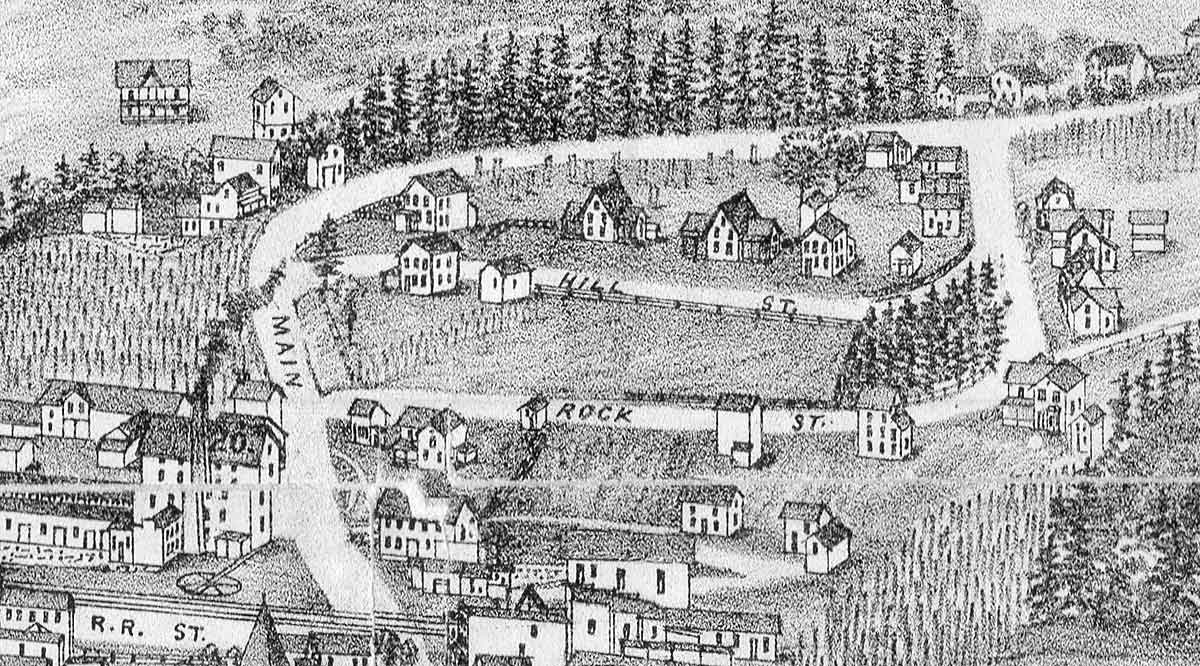
The Neighborhood Center -- TNC
TNC should
be distinguishable from the Neighborhood Edge, interior streets and traditional
neighborhoods.
Large Canopy trees are necessary providing at once scenic relief, cooling shade and places for wildlife.
Buildings must face the green (center) on all sides of the central common, open space accessible to pedestrians and lesser able people.
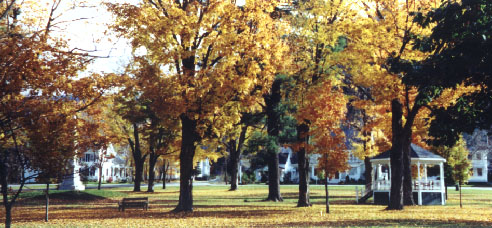
Commercially shops and retail offices should always be allowed in neighborhood centers, but are not required.
Neighborhood center streets should always be more active than side, or edge streets. Traditionally parking is behind the building-faced, urban street, but suburban life usurped the pedestrian space due to a dependence on the automobile, the convenience of automotive access to storefronts and an alleged need for ample parking space to sustain commercial success.
Public Buildings and monuments are positive additions to a town or civic core.
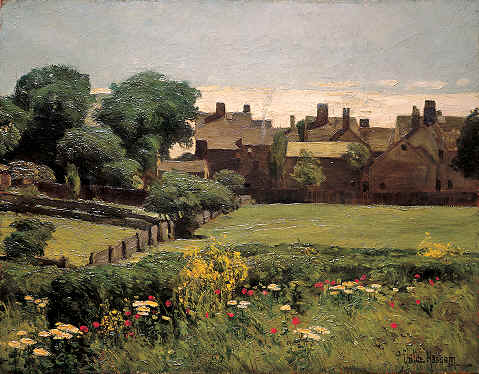
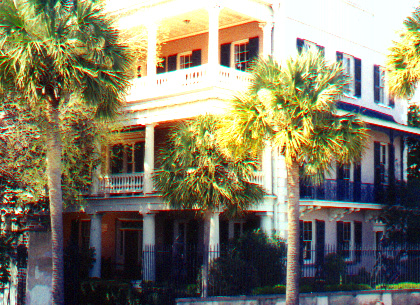
"The memorable quality of Savannah, Paris, and Old Philadelphia can be attributed as much to the organized pattern of trees as to the architecture and urban design."
Henry F. Arnold, Trees in Urban Design, 1992
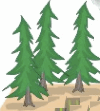 Ecological literacy requires seeing the landscape as a vast repository of possibilities to test the human capacity to live within limits or to exceed those boundaries and thereby weaken the capacity of our surroundings to nourish our species, improve our living conditions and renew resources for future use.
Ecological literacy requires seeing the landscape as a vast repository of possibilities to test the human capacity to live within limits or to exceed those boundaries and thereby weaken the capacity of our surroundings to nourish our species, improve our living conditions and renew resources for future use.
Return to page on ecological thought
Natural Capital | Accounting for natural assets | Worth of ecosystem services
Ecology, Population, Charles Darwin, Aldo Leopold, History, Nature, Photographs, Science, Technology, Water, Wilderness, Words